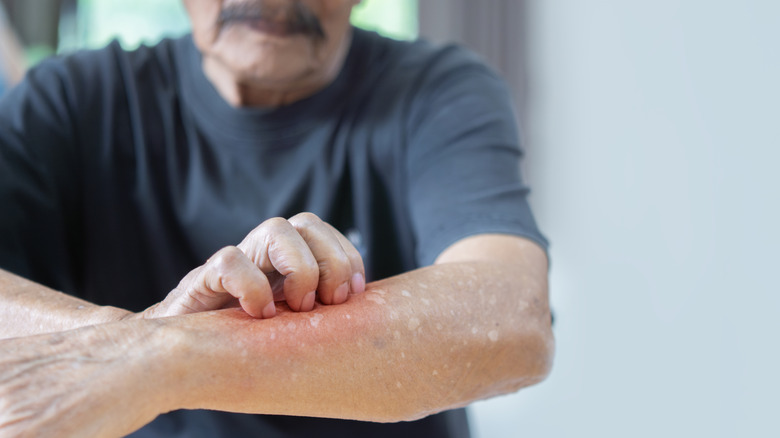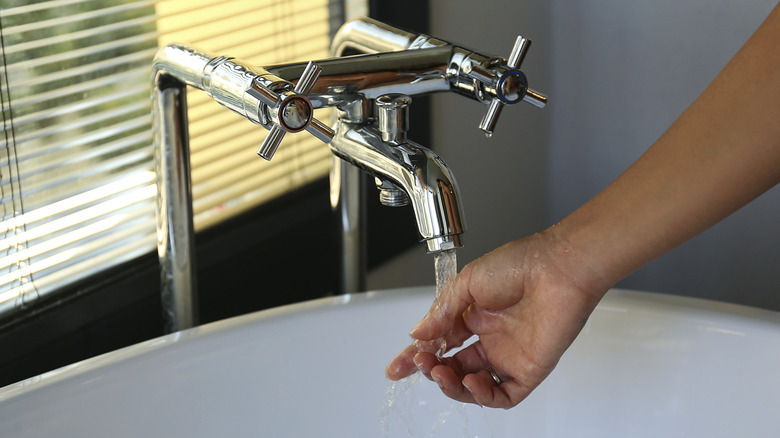The Sneaky Side Effects Of Taking A Magnesium Bath
We may receive a commission on purchases made from links.
When you're trying to fight off muscle soreness, stiff joints, general fatigue, or itchy skin, lowering yourself into a magnesium sulfate bath may sound like the perfect solution. After all, generations of people have sworn by the purported health benefits of magnesium baths (aka Epsom salt baths) to soothe the body and provide musculoskeletal relief. There's just one issue: These types of baths may cause sneaky (and unexpected) side effects that can leave you with additional problems.
Magnesium sulfate baths involve pouring a salt made from magnesium, oxygen, and sulfur under warm running bathtub water. The salt dissolves, leaving you with a magnesium-rich bath to soak away your pains. Some believe that as you soak, the magnesium slowly enters your system. But are their claims of a transdermal transfer true or unknown? Maybe not. A 2017 review in Nutrients noted that although a few studies (including ones that involved magnesium baths) seemed to show that it was possible, the theory lacked enough supportive evidence or scientific proof.
Nonetheless, some claim that magnesium sulfate baths can lead to muscle problems, nausea, and diarrhea due to an overload of magnesium entering the body during a magnesium sulfate bath. However, no credible sources can point to this phenomenon happening under scientific scrutiny. That said, people who drink magnesium sulfate solutions (rather than bathing in them) to relieve constipation may experience those unpleasant symptoms, so it's probably wise to refrai from that.
Hello or goodbye to skin itchiness?
Let's say you want to try a magnesium sulfate bath regardless of whether or not it may lead to an upset stomach or muscle reaction. Even if the magnesium salt doesn't transfer much (or at all) through your skin, it could give you an unpleasant surprise because magnesium sulfate can cause annoying and sometimes scary topical responses.
For example, after taking a magnesium sulfate bath, some people have reported breaking out in hives or a rash. (Learn the difference between hives and rashes.) Therefore, you might want to just apply a little magnesium sulfate and warm water on a small area of your body as a test. You should also avoid taking a magnesium sulfate bath if you have an open cut or sore.
Magnesium sulfate doesn't always cause skin irritation: It can be helpful for some people with conditions including eczema. In an article for HealthCentral, skin disorder specialist Dr. Danielle Dubin explained that topical magnesium might serve in an anti-inflammatory capacity, thereby taming eczema. However, she stressed that "reports of efficacy are purely anecdotal or based on other studies involving magnesium sulfate."
That said, Dr. Dubin has tips for appropriately using magnesium sulfate baths for eczema, such as moisturizing afterward, slipping into magnesium baths occasionally (rather than frequently), and adjusting the amount of magnesium salts based on your reaction. Consequently, you may need to experiment to find out how bathing like this will affect your skin.
Warm water may be the real secret ingredient
All said, taking a bath with magnesium salts appears to be a relatively safe practice to attempt to restore and rejuvenate your tired muscles or recover from a flare-up of eczema. (You can avoid flare-ups of eczema in other ways, too, like carefully planning your diet and paying attention to triggers.) But you might do just as well at calming your body and mind by taking a regular warm-water bath.
According to sports medicine expert Dr. Dennis Cardone in a Nike interview, the real secret to a magnesium bath may be the bathing part. "The benefits of an Epsom salt bath appear to be wholly related to the soaking in warm water," he said, adding that "soaking in a warm bath can be relaxing and benefit [one's] mental and emotional health." A 2019 review in Sleep Medicine Reviews highlighted the sleep quality advantages of having a warm bath or shower before bedtime. Similarly, a 2025 study in Physiological Reports concluded that post-workout hot baths or showers could improve feelings of muscle fatigue.


